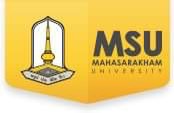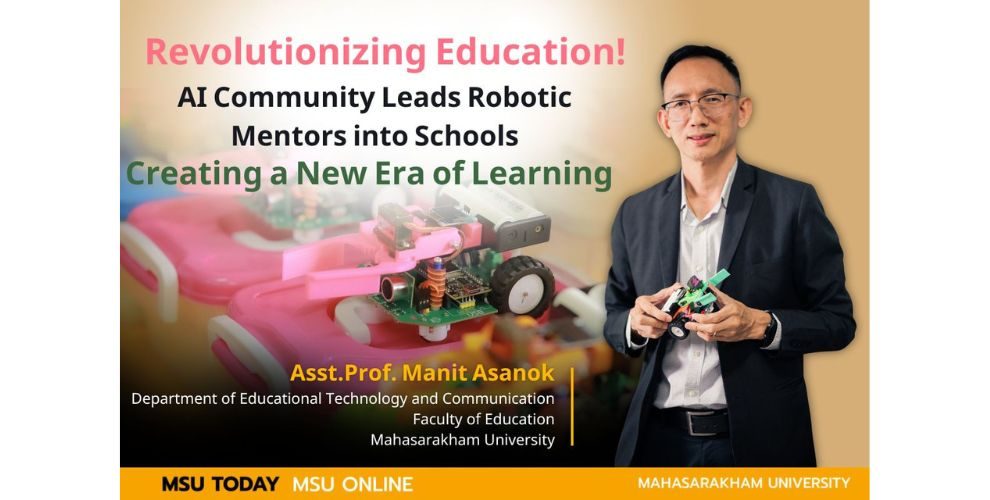Revolutionizing Education! The AI Community Leads Robotic Mentors into Schools, Creating a New Era of Learning
Researchers from Mahasarakham University (MSU) are bringing robot technology and artificial intelligence (AI) into community schools, marking an effective and modern approach to education. Their initiative provides training on how to use robots for educational purposes in community schools, not only allowing students to interact with new technology but also enhancing their knowledge and understanding in the critical areas of science, technology, engineering, and mathematics (STEM), which are fundamental to 21st century skills development. Similarly, Asst.Prof. Manit Asanok, a lecturer in the Department of Educational Technology and Communication, along with his experienced research team from the Faculty of Education, MSU, has introduced an educational model through their “Educational Robotic Training Service Model in Community Schools” initiative.

Research Background
Teaching computer science in schools has become a new educational concept in the 21st century, where digital technology plays a vital role in human life and is rapidly evolving. The aim is for these tools to help prepare human resources to become innovators, enhancing future innovations and quality of life. Coding is expected not only to teach programming but also develop logical and systematic problem-solving skills. Interest in basic coding concepts has increased globally, and many countries have integrated coding into their core curricula, including Thailand, where it is part of the “Computing Science” subject. However, in Thailand, challenges such as a lack of learning experience among students, a shortage of qualified teachers, and teachers’ limited ability to teach computational science in community schools persist. There are efforts to reform the education system in Thailand by improving the teaching and learning processes related to computer science, through the introduction of new technologies and innovative learning to promote active learning in schools throughout Thailand. In particular, robot-based learning is used to develop computational thinking and coding skills, both in terms of curriculum and instruction. Since children’s interests are often focused more on play than knowledge, coding tools that capture their attention are essential. The use of robots helps students concentrate, stay motivated, and enhances their problem-solving abilities and creative thinking. It allows them to learn programming and computational thinking through play while also strengthening their STEM capabilities, which can be applied to solving community problems or developing innovations.

What is Special About this Research?
The learning activities provided through the educational robotic mentoring service combine community service with academic teaching, personal development, and civic engagement. Students participate in structured service projects that meet the specific needs of the community, reflecting on their experiences to deepen their understanding of the subject matter and foster a stronger sense of civic responsibility. This experiential learning process has gained increasing recognition as a valuable approach for developing self-awareness and fostering the holistic growth of student teachers.
The standout feature of this educational robotic mentoring service is its ability to deliver “at least three benefits from one action” as follows:
- Mahasarakham University serves the community
- Student teachers gain practical teaching experience through their roles as training mentors
- Schools provide students the opportunity to learn computational science through the use of robotic technology.

Who are the Target Audience for this Research?
The target audience includes students aged 11 to 15, and their teachers, in community school networks within the service area of MSU, located in Tha Song Khon subdistrict, Mueang district, Maha Sarakham province.

Is the Research Currently Being Implemented?
The educational robotic mentoring service model in community schools stands out due to its design-based research approach. The training service curriculum was developed based on the needs of teachers in community schools and is being continuously tested and improved through real-world trials.

How Should the IT Education System Be Improved or Developed to Prepare Students for the Future Job Market?
The IT education system should focus on promoting and supporting education systems and visions that keep up with technological changes by updating curricula and enhancing the skills of educators to stay knowledgeable and up-to-date with technological advancements.

How Can We Bring This Research to the Community?
To integrate research into the community, there must be genuine collaboration with the community. Providing what they need and ensuring continuous involvement with sincerity will lead to genuine community participation and acceptance.

What Advice Do You Have for New Researchers?
When conducting research, always think about how the research will benefit the community. What are the problems and needs of the community? Especially in educational networks, researchers should engage the community in the process, rather than merely collecting data for publication. Success isn’t measured by publication but by the outcomes of collaboration, where both sides benefit.

For more information contact: Asst.Prof. Manit Asanok and Asst.Prof. Manwika Kittipron, Department of Educational Technology and Communication, Faculty of Education, Mahasarakham University
Email: [email protected]
Thai article: https://news.msu.ac.th/msumagaz/smain/readpost.php?mid=620



Leave a Reply